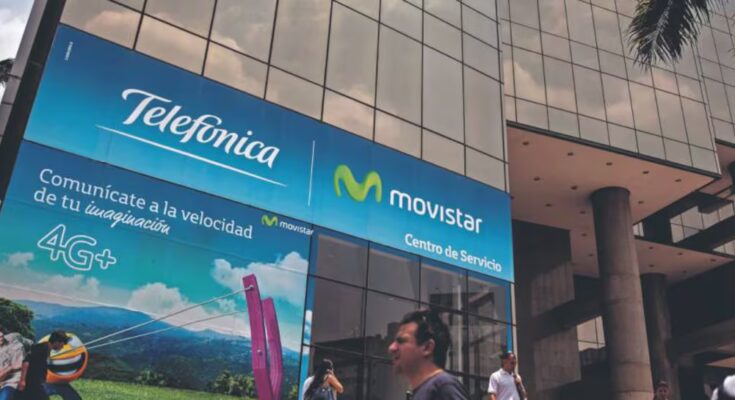The president of Telefónica, Marc Murtra, confirmed on the 4th, in conjunction with the presentation of the 2026-2030 Strategic Plan, the company’s firm desire to abandon Chile, Mexico and Venezuela. The announcement did not cause much surprise in the first two countries, where the Spanish company has already started the exit process and contacted potential buyers. But in the Venezuelan case, it has raised many questions among analysts due to the specificity of this market and the restrictions imposed by the Nicolás Maduro regime on everything that has to do with foreign companies.
Telefónica landed in Venezuela in 2004 with the purchase of Telcel from Bellsouth, as part of a larger operation through which it acquired the 10 branches of the American company throughout Latin America for 4,731 million euros. Although the price paid for Telcel was not specified, it is estimated that the company, then chaired by César Alierta, paid around 800 million euros (at the 2004 dollar exchange rate). The subsidiary was one of the most profitable in Latin America until Hugo Chávez’s regime adopted restrictive measures to prevent multinationals from repatriating their profits. The economic crisis and hyperinflation did the rest. A situation that has led to losses in the millions and devaluation of assets for the Spanish company, although its exact extent is not known because Telefónica has not broken down the results of the Venezuelan branch since 2017.
Under the pressure of this context of continuous losses and commercial uncertainty, Telefónica has finally decided to leave Venezuela. But it will face serious difficulties in getting rid of its subsidiary, as has happened to the countless foreign multinationals that have abandoned the country due to the drift of the Bolivarian regime since Chávez came to power in 1999. Hyperinflation, exchange controls and the complexity of repatriating the country’s profits make it extremely difficult to find an investor willing to take on the company.
The precedents of other foreign companies indicate only two ways to leave the country: permanently ceasing operations or finding a local buyer who has the approval of the authorities. Obviously the first solution is the least recommended because it involves the loss of all the country’s assets and investments. Among the companies that had no choice but to adapt to this abrupt exit was the American Kellogg’s, which left Venezuela in May 2018. Shortly after, the government took control of its factories and, despite warnings from the company about the illegal use of its brand, continued the production of cereals.
Others were forced to leave after expropriation orders issued by the government. This is the case of General Motors, which ceased operations in 2017 after the authorities confiscated its main plant in Valencia. Very similar cases have been experienced by the oil companies ExxonMobil and ConocoPhillips; the Mexicans Helmerich & Payne; or the Hilton hotel chain. The Spanish agricultural products company Agroisleña was expropriated in 2010 and renamed Agropatria.
To avoid this total loss of assets, other multinationals have chosen to agree their exit with the Government through agreements with local partners or investors well connected to the regime, albeit at liquidation prices and heavy capital losses. The Bridgestone tire company, after 60 years in the country, sold its assets in 2016 to the Corimon Group, a private Venezuelan industrial conglomerate. The same thing happened to Pirelli in 2018, which reached an agreement with a group of South American entrepreneurs and the Sommers International company. The latest case involved Unilever, which last July sold its ice cream business, including the popular Tío Rico brand, to Venezuela’s Mack, a trucking company with no connection to the food sector, but well connected to political power.
Inditex is an example of an agreed solution. The Spanish company that owns brands such as Zara, Bershka, Massimo Dutti and Pull&Bear left the country in 2021. But it returned in 2024, with the opening of the largest Zara store in Latin America in Caracas. The textile group now operates in franchising with the Futura Group, owned by the Venezuelan-Lebanese tycoon Camilo Ibrahim Issa, well connected with the leaders of the regime such as the vice-president Delcy Rodríguez, and which several media refer to as the airline Plus Ultra, saved by the Spanish government, although the entrepreneur denies any link with it.
Authorizations and potential buyers
In addition to the general difficulties associated with leaving the country, Telefónica will have to overcome sector-specific legislation. The most critical requirement for selling a telecommunications operator is to obtain prior authorization from the National Telecommunications Commission (Conatel). According to national legislation (Organic Law on Telecommunications), both the operating license and the assignment of frequencies (use of the radio spectrum) are non-transferable without the prior and express consent of Conatel.
Another conflict added in the event of a sale is that in Venezuela there is no number portability, the procedure that allows you to change companies while keeping your number. According to various Venezuelan media, the absence of this mechanism would force an orderly transaction – maintaining the brand – even if ownership changed hands to guarantee the rights of the almost 9 million customers that Movistar currently has.
The Authority can also condition approval on the new operator’s commitment to comply with specific investment plans, expansion of coverage and quality improvements within certain deadlines. It should be remembered that Telefónica committed earlier this year to an investment of 500 million dollars for the extension of the 5G network, which a potential buyer must take on. And, in the latter case, Conatel can invoke public interest or national security to veto the sale.
Monopoly risk, the most common criterion in any country for authorizing a concentration operation, does not appear to be the greatest difficulty in the case of Venezuela, given the degree of interference and discretion of the Maduro regime in intervening in the market economy. Indeed, in 2007, Chávez renationalized CANTV (Compañía Anónima Nacional Telefonos de Venezuela) and its mobile telephone subsidiary, Movilnet, which were in the hands of a consortium led by the American Verizon.
An agreement with CANTV to absorb Telefónica’s assets would not represent any obstacle in the fixed broadband segment, where the state company holds a 46.2% share and Movistar just 1.6%, according to the latest official statistics from the end of 2024. Greater inconveniences would occur in mobile telephony, where Movistar leads with 42.1% of the market, compared to the 23.2% it holds. Movilnet/CANTV. A union between the two would create a company with a stake of more than 65%.
Another option would be a deal with Digitel, owned by the Cisneros Group, owned by the family of the late businessman Oswaldo Cisneros, who managed to stay out of the political conflict and continue doing business in a hostile environment. for investments. Digitel dominates 35.6% of the mobile market share and 13.7% of fixed broadband.
Further afield is the entry of a foreign investor such as Millicom, the Luxembourg company that operates in several Latin American countries under the Tigo brand and which has acquired Telefónica’s activities in Colombia, Ecuador and Uruguay. The restrictions of the Venezuelan Executive make an operation of this type almost impossible.



